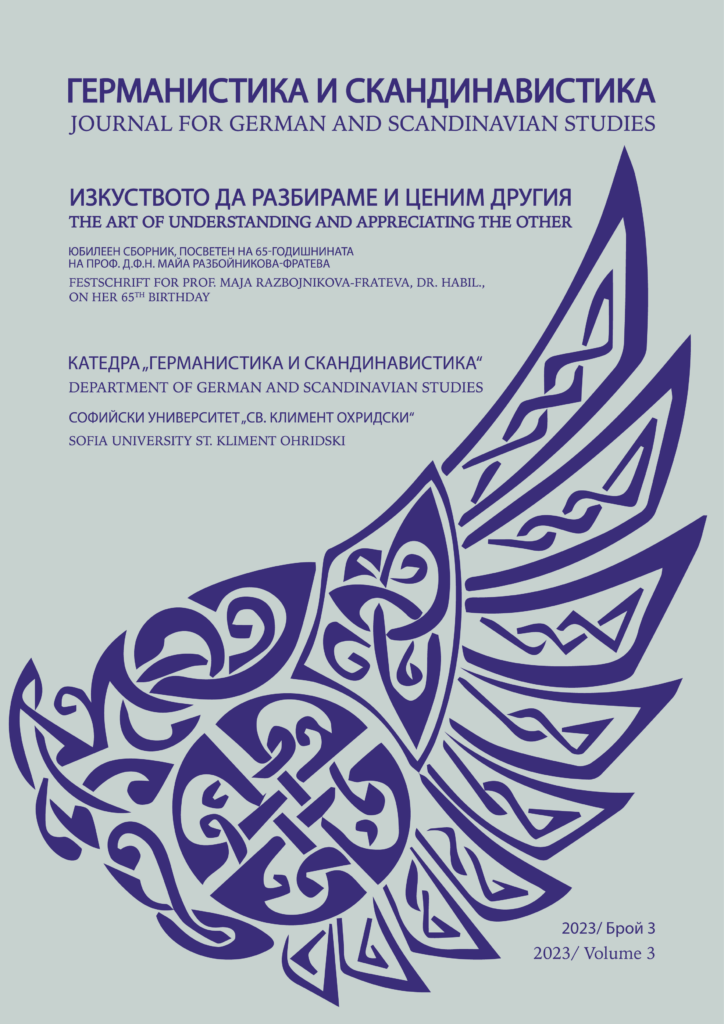To download an article, click on its title.
Volume Editors: Maria Endreva, Ivan Tenev
Date of publication: October 1, 2023
ISSN: 2815-2867
Contents (in English)
Author list (in Bulgarian and English)
Foreword (in English)
Prof. Maja Razbojnikova-Frateva at 65 (in English)
The contribution of Prof. Maja Razbojnikova-Frateva to the study of German-language literature and to German Studies in Bulgaria (in Bulgarian)
Maria Endreva Sofia University St. Kliment Ohridski (Bulgaria)
Prof. Maja Razbojnikova-Frateva as a translator and mediator in the dialogue between cultures (in Bulgarian)
Reneta Kileva-Stamenova Sofia University St. Kliment Ohridski (Bulgaria)
LINGUISTICS
How to {make} things {be <some way>} or {do <things>} – Modelling Danish, Swedish, and Bulgarian Object Control and Object Predicative Structures
Konstantin Radoev Sofia University St. Kliment Ohridski (Bulgaria)
The communicative action pattern of appreciating and its realization in the text type ‘academic festschrift’ (in German)
Mikaela Petkova-Kessanlis Sofia University St. Kliment Ohridski (Bulgaria)
The place of German Grammar by Prof. Konstantin Galabov in university literature (in Bulgarian)
Lilia Burova Sofia University St. Kliment Ohridski (Bulgaria)
LITERARY STUDIES
German-language literature in Bulgaria since 2000. Statistics and some aspects of the reception (in Bulgarian)
Violeta Vicheva Bulgarian Academy of Sciences, Institute for Literature (Bulgaria)
Psychology and the emotions in the world of literature. Some observations on an example from German sentimentalism (in Bulgarian)
Ivan Popov Sofia University St. Kliment Ohridski (Bulgaria)
Patriotism and cosmopolitanism in the work of Hans Christian Andersen (in Bulgarian)
Svetlana Arnaudova Sofia University St. Kliment Ohridski (Bulgaria)
Centers and peripheries in the public memory and the research of the Holocaust (in Bulgarian)
Daniela Decheva Sofia University St. Kliment Ohridski (Bulgaria)
The monument of Heine on Town Hall Market in Hamburg (in German)
Udo Köster Hamburg University (Germany)
“The border” as a topos in recent Bulgarian literature (in German)
Nikolina Burneva St. Cyril and St. Methodius University of Veliko Tarnovo (Bulgaria)
Photography as a treasury of literary metaphors in Nino Haratischwili’s novel Lack of Light (in German)
Ralitsa Ivanova St. Cyril and St. Methodius University of Veliko Tarnovo (Bulgaria)
On the cover of Der Heiduck by Hans Wachenhusen (in Bulgarian)
Nikolay Chernokozhev Sofia University St. Kliment Ohridski (Bulgaria)
Аspects of the mythical on the example of Рobert Мusil’s Kakanien (in German)
Vladimira Valkova St. Cyril and St. Methodius University of Veliko Tarnovo (Bulgaria)
TRANSLATION STUDIES
The standardised structure of German indictments and the particularities of their translation into Bulgarian (in German)
Reneta Kileva-Stamenova Sofia University St. Kliment Ohridski (Bulgaria)
METHODOLOGY AND DIDACTICS
Exchange project: Images of history in Bulgaria and Austria (winter semester 2022/23)
Jacqueline Dyballa and others Sofia University St. Kliment Ohridski (Bulgaria)
TEXTS AWARDED IN COMPETITIONS FOR STUDENTS AND PUPILS
Annual competition for essay writing in Danish language
Gabriela Atanasova and others
TRANSLATIONS OF PROSE AND POETRY
Heiner Müller: “Herakles 2 oder Die Hydra”
From German to Bulgarian: Eva Patsovska-Ivanova
Paul Celan: “Die Niemandsrose” (poems)
From German to Bulgarian: Ana Dimova
Translation of poetry from Danish and Norwegian
From Danish and Norwegian to Bulgarian: Mihail Baykov
Fridtjof Nansen: Paa ski over Grønland (excerpt), Eskimoliv (excerpt)
From Norwegian to Bulgarian: Svetla Stoyanova
Editorial policy of the Journal for German and Scandinavian Studies
(in Bulgarian and English)
